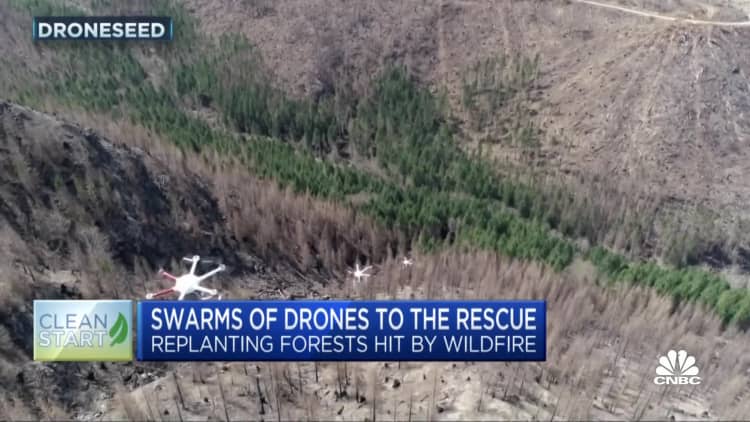Mast Reforestation is using drones, nurseries and carbon offsets to revitalize land after wildfires
Seattle startup Mast (formerly DroneSeed) takes a high-tech approach to reforestation.
Mast Reforestation
Last year, the U.S. endured more than 68,000 wildfires, consuming around 7.6 million acres nationally, according to the National Interagency Fire Center.
Both numbers are up from 2021, continuing an unfortunate trend taking place over the past two decades as a result of a rapidly changing climate.
All that burnt land means the country is in need of a dramatic increase in reforestation. But there’s not a big enough supply of native seeds and seedlings to meet the regrowth demands.
That’s where a Seattle startup called Mast Reforestation sees an opportunity.
Founded in 2016 as DroneSeed, Mast is best known for flying swarms of unmanned aerial vehicles over charred land to drop seeds that can take root and grow. Mast still provides aerial seeding, but drones are just one piece of its growing “reforestation as a service” business, said founder and CEO Grant Canary.
On Tuesday, Canary said Mast has acquired Cal Forest Nurseries, which grows tens of millions of native conifer seedlings per year for timber companies, private landowners and public agencies in the Western states. Terms of the deal weren’t disclosed.
The acquisition comes two years after Mast purchased SilvaSeed, a company that collects and processes cones and seeds from wild forests. Mast now has 130 full-time employees, including 45 from Cal Forest.
Canary said technology is needed to “scale reforestation,” and the addition of Cal Forest should help shorten the currently yearslong time that Mast’s customers have to wait for native seeds and seedlings.

Reforesting faster
“We need to pull carbon out of the atmosphere, and trees are highly evolved and effective at doing that,” Canary said about the climate change benefits of speedier reforestation.
Besides improving air quality, trees growing at the right density in a forest support greater biodiversity and can even serve as a kind of natural chiller plant, keeping water beneath their roots cleaner, colder and more plentiful in rivers and dams, Canary said.
Mast’s planned 2023 reforestation projects include a site in Montana to expand elk habitat around Yellowstone National Park and others in fire-affected communities.
In addition to providing supplies, Mast also works to sell carbon offsets for reforestation projects. That money defrays the costs of seeds, drone flights and other expenses and keeps landowners from having to shoulder the financial burden alone.
Companies buy the credits to meet their internal sustainability goals or to comply with laws that require them to offset their greenhouse gas emissions or other negative environmental impacts.
Last year, Mast went to work restoring a Western Oregon forest at Henry Creek as a pilot project, using its own seed supplies, and a combination of drone- and hand-planting techniques. For that initiative, the company sold carbon credits to tech companies including Shopify. It now intends for every reforestation effort to have an associated sale of carbon offsets.
Mast Reforestation, formerly known as DroneSeed, is ramping up the supply of native seeds and seedlings to restore wild lands after record fires.
Courtesy: Mast Reforestation
“The next step is to run that playbook for landowners across the West,” said DBL Partners’ Nancy Pfund, an early investor in Tesla, Mast and other climate-tech companies. “I think we will begin to see the company deftly address the shortage of high-quality carbon offsets for blue chip corporates with net-zero targets.”
While some investors shy away from businesses that rely on credits for revenue, the “compliance market” is growing. Carbon dioxide permits, which are traded on the global market, grew to a record value of $851 billion in 2022, according to Refinitiv estimates.
A year after Mast replants a site, a third-party forester will go out to test some sample plots to make sure trees are growing as planned and are bringing the intended environmental benefits.
Mast also sets up an endowment for each project that finances 100 years of monitoring of each site using a mix of manual inspections on site, and aerial imagery.
The company has other revenue models in its future plans. That includes targeting real estate businesses that want healthy forests on or near their properties, and state and federal agencies tasked with reforestation.
Elk at Old Faithful in Yellowstone National Park
Source: Spring Creek Ranch
Mast has raised more than $36 million in venture funding from climate-focused investors including Alexis Ohanian’s Seven Seven Six, Social Capital, DBL Partners, Marc Benioff’s Time Ventures, Elemental Excelerator, and Spero Ventures.
Other companies are merging software with hardware to take on the global reforestation effort. Seed banks and reforestation organizations such as Flash Forest in Canada, Terraformation in Hawaii and the nonprofit WeForest in Brussels have also attracted the support of venture investors.
Pfund told CNBC that adequate reforestation will require a robust coalition of government, nonprofits, corporates and innovative startups. While forestry and reforestation aren’t getting the same federal funding as the electrification of transport, “what may look small and unknown today in reality holds the potential to create positive global change and, in so doing, deliver strong returns to investors,” she said.
For all the latest Technology News Click Here
For the latest news and updates, follow us on Google News.

